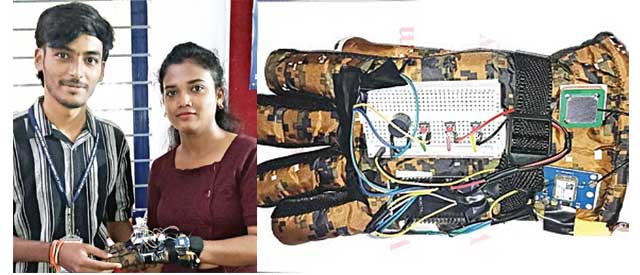Daijiworld Media Network - Mysuru
Mysuru, June 2: A 21-year-old engineering student in Mysuru has developed a smart wearable device aimed at enhancing women’s safety in public spaces using intelligent geofencing technology.
Karan D, a final-year student from the Electronics and Communication Engineering Department at Sri Jayachamarajendra College of Engineering (SJCE), showcased his innovation—Intelligent Geofence-enabled Wearable System (IGWS)—during the college’s Open Day 2025 event held on May 31.

The device allows users to define virtual “safe zones” through geofencing, which uses GPS or Bluetooth-based tracking. If the user exits or enters these zones, real-time alerts, including the user's live location, are automatically sent to pre-selected emergency contacts.
Stranger-following detection and live alerts
One of the device’s standout features is its ability to detect if the user is being followed. “If a woman is followed by the same Bluetooth signal or mobile device for more than three minutes across multiple geofenced zones, the device’s ESP32 chip sends a vibration alert to the user and forwards the stalker’s Bluetooth MAC address and the user's live location to her emergency contacts,” said Karan.
Geofence-based safety timer
The system includes a safety timer function. For instance, if a user plans to return home within 30 minutes and fails to enter her home’s geofenced area within that time, the device automatically sends her location to emergency contacts. It also includes a "return home safety reminder" that sends alerts if the user remains outside her home zone after a certain time.
Danger-zone notifier
The device also features a danger-zone notifier, which cross-references the user’s location with a preloaded list of high-risk areas. If the user enters one of these zones, the wearable activates a buzzer and alerts her contacts. If she stays in the zone beyond a set duration, the alerts are repeated.
Room for upgrades
Currently embedded in a wearable glove, the device is fully functional but Karan acknowledged that gloves may not be convenient for daily use. “The system is better suited for integration into a smartwatch, which offers greater practicality and comfort. I plan to work on adapting it accordingly,” he said.
Professors Madusudan M P and Yashwanth S D from SJCE’s Electronics and Communication Engineering Department guided the project and are now helping Karan explore opportunities to present the IGWS to tech companies for further development and potential deployment.